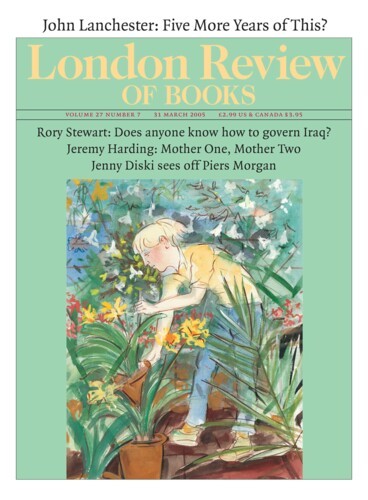Catching news about the Michael Jackson trial, I can’t help being reminded of a caustic song by Dan Bern, a singer less famous than Jackson by several orders of magnitude, called ‘Too Late to Die Young’. ‘The day that Elvis died was like a mercy killing,’ it begins, before turning its attention to the inglorious late careers of other fallen idols of American popular culture, challenging listeners to ‘name the last good film that Marlon Brando made/While trying to keep his kid from going to jail.’ ‘Too late to crash, too late to burn, too late to die young,’ goes the chorus. The song is softened somewhat by the singer’s sense of his own life lacking much direction or purpose; and it’s more than aware that dying young isn’t on its own enough of an achievement to turn someone into James Dean.
‘Too Late to Die Young’ points up, too, the contradictions of being both a star and a human being, in terms not only of what consitutes the good – dying young v. living an ignominiously long life, for example – but also of the expectations of the crowd, who want their (our) heroes to be above common human frailties, but all the same can’t help probing for weaknesses, and are both sorely disappointed and gleefully reassured when we find them. This isn’t a new phenomenon – look at Ovid’s Metamorphoses, full of unedifying and salacious gossip about the sex lives of the gods (who are explicitly compared in the poem to Rome’s ruling elite) – though there may be more appetite now than there used to be for scandal about those who are famous only for being scandalous. Meanwhile, there’s little chance of scandal derailing ‘compassionate, decent’ Paul Wolfowitz’s bid to become the next president of the World Bank.
The singular thing about Michael Jackson’s frailties is that they are far from humanising: the more that is revealed, the more alien he appears. Whether or not he is found guilty seems almost beside the point. As he sang in ‘Billie Jean’, ‘be careful of what you do ’cause the lie becomes the truth.’ And some of the allegations against him seem too good, though that’s hardly the word, to be true. He is said, for example, to have ‘humped a mannequin’ while his accuser watched. How apt: for isn’t Jackson himself a kind of mannequin – a superstar by the time he was 11 years old, denied the opportunity to grow up, inflated by the expectations of others, an overgrown child prodigy metamorphosing, with the help of countless surgical procedures, into a plastic monster. I can’t be alone in finding his etiolated, chopped-about face almost impossible to look at: which may be the intention, or part of it, though it would be foolish to claim to know what motivates such self-disfigurement. From the outside, however, he looks like a ghoul, a monstrous apparition, the Ghost of Celebrity Future. As he sang in ‘Thriller’, ‘Night creatures call/And the dead start to walk in their masquerade/There’s no escaping the jaws of the alien this time.’ Though maybe that’s more productively read in relation to Wolfowitz.
Michael Jackson was born in Gary, Indiana on 29 August 1958. Managed by their father, Michael and his older brothers, Jackie, Tito, Marlon and Jermaine, the Jackson Five, had their first hit in 1969 with ‘I Want You Back’. Three more number ones followed in quick succession. Jackson’s solo career began in 1972, running parallel to his work with his brothers (he finally left the family band in 1986). It seriously took off in 1979 with the album Off the Wall, and went stratospheric with Thriller (1982), which has gone on to sell more than 50 million copies. The outstanding songs on that album are three that Jackson wrote himself: ‘Wanna Be Startin’ Somethin’’, ‘Beat It’ and ‘Billie Jean’; he also wrote ‘The Girl Is Mine’, an execrable duet with Paul McCartney, but the less said about that the better.
His lyrics can be hard to make out, but they’re conveniently reprinted in the inner sleeve, alongside creepy pictures of Jackson variously dancing with zombies – he is, or was, an inhumanly good dancer – and hugging a tiger cub. Some of them are disturbingly bizarre: ‘You’re a vegetable, you’re a vegetable/Still they hate you, you’re a vegetable/You’re just a buffet, you’re a vegetable/They eat off of you, you’re a vegetable.’ Self-loathing doesn’t begin to describe it. Bad (1987) was almost as popular, and almost as good. It was the first album I ever bought – on cassette, from WH Smith in Basingstoke. I must have been about the same age that Jackson was when he got his first record deal. As a ten-year-old, I’d have leapt at the chance to visit his Neverland ranch and stay over, though thankfully my mother would never have let me.
If he’d died then, a few weeks shy of his 30th birthday, how differently the legend might have panned out. As it is, in 1992 Sony gave him an $18 million advance for Dangerous, which might as well have been called ‘Forgettable’; in 1994, he handed over an alleged $20 million as an out of court settlement with a dentist who’d accused him of molesting his 13-year-old son. And since then it’s been downhill all the way to the dock. Not too late to crash and burn, but far too late to die young.
Send Letters To:
The Editor
London Review of Books,
28 Little Russell Street
London, WC1A 2HN
letters@lrb.co.uk
Please include name, address, and a telephone number.

